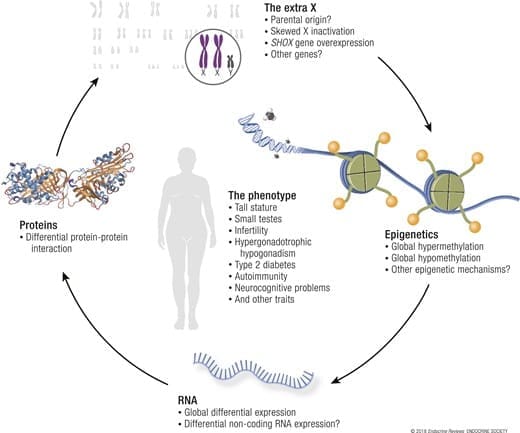
We need to talk about hormones – the minuscule yet mighty forces within our bodies. Hormones are chemical messengers critical in steering numerous physiological processes, from growth and metabolism to mood and reproduction. Produced by the body’s endocrine glands, hormones travel through the bloodstream, influencing almost every cell and organ system where they trigger specific responses.
Sometimes, however, these mighty messengers get lost, causing hormonal imbalance.
Classic examples are diabetes where you lack insulin or Addison ’s disease where you lack adrenal cortex hormone.

Another example – rarer and currently gravely underdiagnosed – is Klinefelter syndrome. Klinefelter syndrome (KS) is where boys are born with an extra X chromosome, resulting in low levels of the male sex hormone testosterone. KS affects around 1 in 600 boys in Denmark.
In connection with International Men’s Health Week, we have talked with postdoctoral researcher and endocrine medical doctor (MD) Simon Chang, who is funded by the Danish Diabetes and Endocrine Academy (DDEA) to investigate Klinefelter syndrome.
What power does testosterone play in maintaining health for men, what are the consequences of hormonal (im)balance, and how does his research aim to advance treatment at the gene level?
Source: Morbidity in Klinefelter syndrome and the effect of testosterone treatment – PubMed (nih.gov) by Simon Chang, Anne Skakkebaek, Shanlee M Davis, and Claus H. Gravholt
MD Simon Chang works in the clinic at the Department of Endocrinology at Odense University Hospital. Here, he treats people with severe hormonal imbalance every day.
People who experience hormonal imbalance will often describe a variety of symptoms from the whole body, underlining the multiple functions of many individual hormones. This is also the case in boys and men with Klinefelter syndrome.
“If you have low testosterone levels, you may, for example, experience low energy levels, weaker bones and osteoporosis, decreased metabolism and weight gain, cognitive development challenges, and infertility,” says Simon Chang.
Klinefelter syndrome poses a high risk of additional morbidities and developmental issues, yet remains significantly underdiagnosed. On average, men are 27 years old before they are diagnosed, despite the fact that KS is a condition that they have had since birth.
Under the title ‘Klinefelter Syndrome and Male Hypogonadism – a Human Disease Model for Investigating Genotype-Phenotype Relations Associable with Cardiometabolic Risk and Testosterone Replacement Rherapy,’ Simon Chang’s research focuses on understanding the impact of low testosterone levels on normal body functions and evaluating testosterone replacement therapy as a treatment for hormonal imbalances in affected men. This therapy could potentially mitigate their risk of developing further diseases.

Testosterone, a critical hormone, has effects that are not fully understood, especially in everyday well-being. Chang uses Klinefelter syndrome as a model to explore the consequences of testosterone deficiency, which could benefit others who, for other reasons, experience low levels of testosterone.
Regarding the efficacy of testosterone replacement therapy, Chang notes:
“Our clinical experience supports its effectiveness. Men with Klinefelter syndrome have spent their lives with low testosterone levels and report significant improvements in their quality of life with treatment, expressing a strong preference to continue it. However, more studies are needed to confirm these observations scientifically.”
Chang’s research also aims to reveal the health effects of such treatments, particularly at the genetic level, exploring how genes are expressed in response to bodily functions.
“We have analysed numerous disease markers in men with Klinefelter syndrome and healthy controls. Our goal is to connect these observations to genetic expression changes, enhancing our understanding of the condition and potentially unveiling new intervention strategies,” Chang explains.
Funded by the DDEA and supervised by Associate Professors Anne Skakkebæk and Professor Claus Gravholt, the study also seeks to leverage data from Danish National Registries in large epidemiological studies, enhancing the depth of research into the condition.
“I am committed to enhancing awareness of this condition and discovering new methods to support affected boys and men,” says Simon Chang.
The project is conducted in collaboration with, among others, Esbjerg Hospital, the Unit for Thrombosis Research, and Aarhus University Hospital, Department of Epidemiology.
Learn more about how Chang’s study aims to deepen the understanding of testosterone’s physiological roles and its genetic impact, paving the way for targeted treatments in the future.
“Seeing how hormonal imbalances can severely affect someone’s well-being, and witnessing the significant improvements in health and quality of life that hormone treatment can bring, you no longer doubt the power of hormones,” Simon Chang concludes.
Chang’s hypothesis suggests that being born with Klinefelter syndrome and being exposed to low testosterone levels from an early age leads to a unique genetic signature with altered expression of key genes. These changes are associated with the challenges observed among patients, including impaired cognitive function and an increased risk of disease.
It is further believed that treating these patients with testosterone could potentially revert some of the genetic changes, thereby also helping to reduce the risk of diseases. Registry studies hypothesise that men with Klinefelter syndrome who receive testosterone treatment may perform better in various aspects of life, including socioeconomically and in terms of disease risk, ultimately reducing the risk of mortality.
Collectively, these studies aim to raise awareness of this condition and incite a more focused effort to ensure all affected are diagnosed as early as possible.
Simon Chang
MD, PhD, Postdoctoral researcher,
simon.chang@rsyd.dk
+45 29298926
EAN: 5798 0022 30642
Reference: 1025 0006
CVR: 29 19 09 09